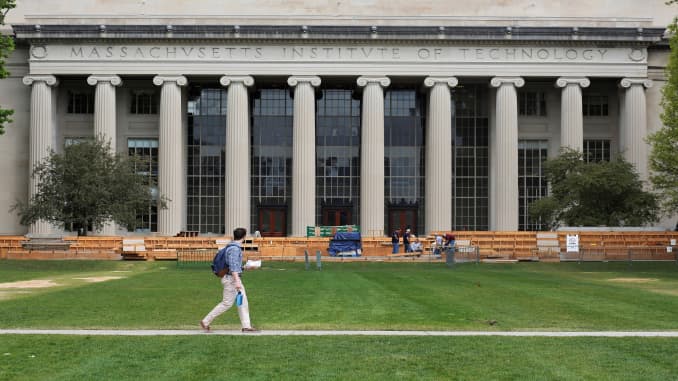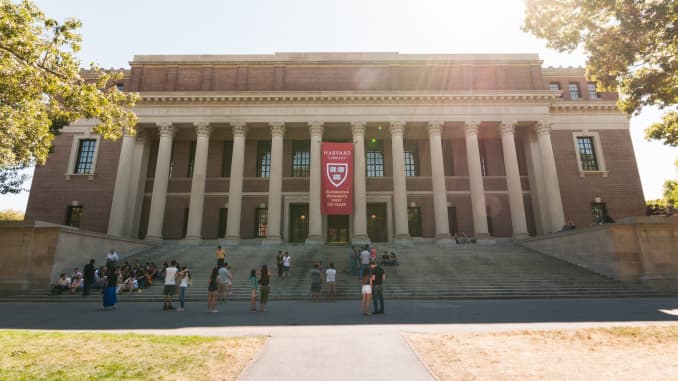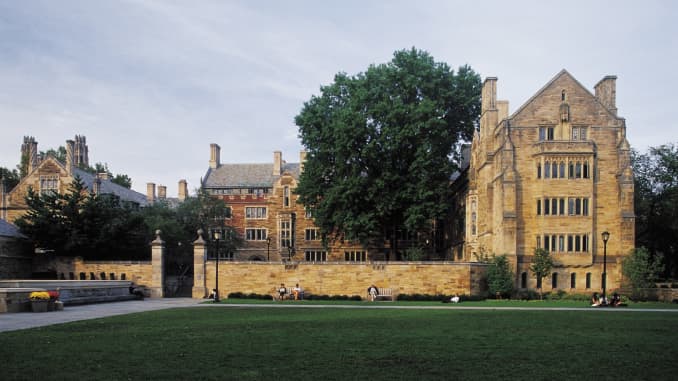
Here is The List of Top 10 MBA Schools in the US 2021 | MBA Programs in the United States
- 1 Why MBA?
- 2 Why the USA?
- 3 Factors That Draw Students to Study in The US
- 4 An MBA Degree is Offered Various Specializations
- 5 MBA in the USA – Admission Process & Eligibility Criteria
-
6
List of 10 MBA Schools in the US
- 6.1 1. Stanford University (tie)
- 6.2 2. University of Pennsylvania, Wharton (tie)
- 6.3 3. Northwestern University, Kellogg (tie)
- 6.4 4. The University of Chicago, Booth (tie)
- 6.5 5. Massachusetts Institute of Technology, Sloan
- 6.6 6. Harvard University
- 6.7 7. University of California Berkeley, Haas
- 6.8 8. Columbia University
- 6.9 9. Yale University
- 6.10 10. New York University (Stern)
Top 10 MBA Schools in US 2021. Master of Business Administration or MBA is one of the most popular post-graduate programs in the World. The two-year MBA program acts as a gateway to a plethora of job and entrepreneurial opportunities. This course provides an understanding related to the administration of the business and managing the business operations. Students from any background, including Science, Commerce, and Humanities can pursue MBA. Such students should also possess skills such as excellent communication, leadership, problem-solving, management, research-oriented, analytical thinking, eye for detail, goal-oriented & ability to work under pressure, strong mathematical skills, etc. The full-time MBA is the most popular among all and includes theory classes, practical projects, and internships. Fresh graduates as well as candidates with a few years of work experience opt for a full-time MBA.
Top 10 MBA Schools in US 2021. Finding the right MBA College among the most reputed ones is a little difficult but important. Giving you the concentrated list of Top 10 MBA colleges. These colleges offer a great history of top-quality academics, an excellent track record of research, and of course placements in top-notch companies.
Why MBA?
Top 10 MBA Schools in US 2021. Everyone from fresh college pass-outs to experienced professionals wants to jump on to the MBA bandwagon, oftentimes without giving much thought to ‘why MBA’. Why not pursue a master’s program in science for science graduates or an MTech program for engineering graduates? If you are mulling over the possibilities of an MBA, be sure to weigh the benefits of this programme in the context of your education and professional aspirations. Be clear as to why you want to pursue it, what are your goals/dreams and how an MBA will help you in achieving these. The clarity in course selection will also help you further determine the exact programme and consequently the college or university where you would rather be pursuing this programme, the specializations that you should be going for it at all. Also, keep an eye on what you want to see yourself doing after completing the management degree.
Some of the key factors that MBA aspirants seek from an MBA programme:
- To gain knowledge
- Adding value to your profile
- Career Progression
- Networking
- Self-growth
- Specialization
Why the USA?
Home to the world’s most sought-after business schools, the USA is considered to be one of the top education destinations for pursuing an MBA across the globe. Their state-of-the-art infrastructure, world-class education system, excellent career opportunities make the United States of America one of the most preferred destinations for MBA aspirants. In 2016-2017, more than one million international students went to the US to pursue higher studies. The United States is the largest MBA market in the world according to the US Department of Education with more than 1,25,000 MBA graduates annually. One might think that a large number of MBA graduates walking out of its universities every year also stiffens competition on the HR front, however, the size of the US economy and the scale of opportunities outweighs the number of people looking for good opportunities.
Factors That Draw Students to Study in The US
- Excellent quality education with industry experience
- Enhanced chances of getting a good/dream job
- Learn from a multicultural environment
- Train students to become an entrepreneur
An MBA Degree is Offered Various Specializations
- General Management
- Marketing
- Operations Management
- Healthcare Analytics
- Event Management and PR
- Marketing
- Finance Management
- Marketing
- Finance and Marketing
- Industrial Engineering
MBA in the USA – Admission Process & Eligibility Criteria
The Masters in Business Administration (MBA) is the most popular master’s degree in the US and is also the most popular among Indian students coming to the US for higher studies. To gain admission into any of the top business schools in the US, you need to fulfill the following process. Check eligibility criteria
List of 10 MBA Schools in the US
Here are the top 10 MBA programs in the country and what it takes to get in, according to U.S. News:
1. Stanford University (tie)
Overall score: 100
Peer assessment score (out of 5): 4.9
Recruiter assessment score (out of 5): 4.5
Acceptance rate: 6.9%
Average undergrad GPA: 3.7
Average GMAT score: 734
Average starting salary and bonus: $168,226
2019 graduates employed at graduation: 67.5%
Employed three months after graduation: 88.5%
Out-of-state tuition and fees: $73,062
2019 total full-time enrollment: 848

2. University of Pennsylvania, Wharton (tie)
Overall score: 100
Peer assessment score (out of 5): 4.8
Recruiter assessment score (out of 5): 4.4
Acceptance rate: 23.1%
Average undergrad GPA: 3.6
Average GMAT score: 732
Average starting salary and bonus: $172,016
2019 graduates employed at graduation: 81.0%
Employed three months after graduation: 93.5%
Out-of-state tuition and fees: $74,500
2019 total full-time enrollment: 1,740

3. Northwestern University, Kellogg (tie)
Overall score: 99
Peer assessment score (out of 5): 4.6
Recruiter assessment score (out of 5): 4.3
Acceptance rate: 27.0%
Average undergrad GPA: 3.6
Average GMAT score: 730
Average starting salary and bonus: $163,752
2019 graduates employed at graduation: 85.6%
Employed three months after graduation: 95.5%
Out-of-state tuition and fees: $73,404
2019 total full-time enrollment: 1,289

4. The University of Chicago, Booth (tie)
Overall score: 99
Peer assessment score (out of 5): 4.7
Recruiter assessment score (out of 5): 4.3
Acceptance rate: 24.2%
Average undergrad GPA: 3.6
Average GMAT score: 730
Average starting salary and bonus: $164,607
2019 graduates employed at graduation: 87.2%
Employed three months after graduation: 95.1%
Out-of-state tuition and fees: $72,000
2019 total full-time enrollment: 1,193

5. Massachusetts Institute of Technology, Sloan
Overall score: 97
Peer assessment score (out of 5): 4.7
Recruiter assessment score (out of 5): 4.4
Acceptance rate: 14.6%
Average undergrad GPA: 3.6
Average GMAT score: 727
Average starting salary and bonus: $160,291
2019 graduates employed at graduation: 79.3%
Employed three months after graduation: 93.5%
Out-of-state tuition and fees: $77,168
2019 total full-time enrollment: 825

6. Harvard University
Overall score: 96
Peer assessment score (out of 5): 4.8
Recruiter assessment score (out of 5): 4.4
Acceptance rate: 11.5%
Average undergrad GPA: 3.7
Average GMAT score: 728
Average starting salary and bonus: $164,872
2019 graduates employed at graduation: 77.3%
Employed three months after graduation: 88.5%
Out-of-state tuition and fees: $73,440
2019 total full-time enrollment: 1,868

7. University of California Berkeley, Haas
Overall score: 94
Peer assessment score (out of 5): 4.6
Recruiter assessment score (out of 5): 4.2
Acceptance rate: 17.7%
Average undergrad GPA: 3.7
Average GMAT score: 725
Average starting salary and bonus: $159,972
2019 graduates employed at graduation: 76.2%
Employed three months after graduation: 91.2%
Out-of-state tuition and fees: $64,656
2019 total full-time enrollment: 591

8. Columbia University
Overall score: 92
Peer assessment score (out of 5): 4.4
Recruiter assessment score (out of 5): 4.2
Acceptance rate: 16.4%
Average undergrad GPA: 3.6
Average GMAT score: 732
Average starting salary and bonus: $164,945
2019 graduates employed at graduation: 78.4%
Employed three months after graduation: 90.4%
Out-of-state tuition and fees: $77,376
2019 total full-time enrollment: 1,284

9. Yale University
Overall score: 91
Peer assessment score (out of 5): 4.4
Recruiter assessment score (out of 5): 4.2
Acceptance rate: 25.2%
Average undergrad GPA: 3.6
Average GMAT score: 721
Average starting salary and bonus: $152,860
2019 graduates employed at graduation: 76.1%
Employed three months after graduation: 91.4%
Out-of-state tuition and fees: $72,350
2019 total full-time enrollment: 722

10. New York University (Stern)
Overall score: 90
Peer assessment score (out of 5): 4.3
Recruiter assessment score (out of 5): 3.9
Acceptance rate: 26.1%
Average undergrad GPA: 3.5
Average GMAT score: 721
Average starting salary and bonus: $168,291
2019 graduates employed at graduation: 85.6%
Employed three months after graduation: 94.2%
Out-of-state tuition and fees: $74,184
2019 total full-time enrollment: 717
Thank You
Read Also – GRE vs GMAT For MBA



More Stories
Top 10 IIT JEE Coaching Institutes in India 2021
Top 10 Girls Colleges in Jaipur 2021-22
GRE vs GMAT For MBA